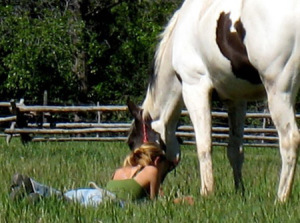
By Cathy Eck
What’s My Passion?
Lots of books and workshops promise to help us find our passion. But ultimately there’s a flaw in the very question, “What’s my passion?” If we have to ask, we’re in our false self. If our false self hijacks our passion and clones it, we can get really stuck in the illusion.
Many people who appear to have great passion aren’t really authentic. They’re actually more enthusiastic or excited than passionate. Some have bought into the idea of “find your passion and get rich.” The True Self sees it more like “find your true expression and your perfect abundance will come.” Fear that we might “sell our soul” causes us to keep our True Self hidden until we let go of enough beliefs to assure that our false self won’t steal our dream and ride it for riches or rewards.
The Word Passion
We can see the problem by looking at the definition of the word passion. The first definition is “strong and barely controllable emotion.” Strong, barely controllable emotion signals a big, fat belief. The True Self state is calm and peaceful. It’s the false self that generates strong, uncontrollable emotions.
Passion is often linked with enthusiasm, which traces back to “Greek enthousiasmos, from enthous ‘possessed by a god, inspired.'” But we have to ask ourselves which God are we possessed by? The word God has two meanings. One relates to ancestors or those who came before us. Ancestors had beliefs and human baggage. The other definition relates to the all-loving creator God — perfect and void of beliefs.
Pure enthusiasm is calm and inspired; it harms no one. What most call enthusiasm is actually excitement — hyped up emotion. When we’re excited, we’re thinking the positive side of a dual thought. We’re ignoring the opposing twin shadow thought that’s generating the strong, uncontrollable emotional to warn us to stop and let go. We mistakenly believe the emotion is telling us to charge forward. Following excitement gets us in big trouble.
The last meaning of passion is connected with the passion of the Christ. This sort of passion means suffering and death. If you hold a strong religious perspective, there’s no way in hell that you’re going to allow yourself to find your passion. Your false self thinks you’ll die. Good trick huh!
Passion as the True Self
If we take the true meaning of Christ, annointed one or initiated one, and add that to the creative, all-loving principal of God, we get a perfect definition of the True Self. When we live from our True Self, we think pure thoughts and find that whatever we do has a joyful quality to it. If we have a particular focus that we enjoy, we’ll do it more easily and skillfully because our True Self is leading. We can even do something that isn’t our thing from our True Self and bring ourself so fully into that activity that we enjoy it. Now we’re living and breathing pure creative expression every minute of our life.
Oddly, when I’m in that state, I feel that passion is the right word. It seems that passion fell along with religion. At one time, people knew that passion wasn’t something you conjured by getting excited about a goal, money, winning, or power. Passion wasn’t related to suffering or death. Passion was bringing an idea out of the oneness into the creative palette of the material world — True Self expression.
The initiates understood that hanging on the cross was code for the final initiation test where one became completely feminine to the world so they could see what was left of their masculine false self. It was an extraordinary feat that required letting go of anything and everything that came their way. When the false self was gone, they were resurrected — their True Self — living completely in a state of passion.
My Own Experience with Passion
When I was about four, I picked up my mother’s Bible and said, “This book is confusing and no one understands it. I’m going to fix it when I’m big.” I couldn’t even read the damn thing, but some part of me had the big picture of my life. I also spent all my time drawing and making things; and I said that I never wanted to do anything else. I wanted to create stuff.
Then I went off and got lost in the false world. I didn’t draw or create anymore. I was as confused by the Bible as everyone else. But slowly, I remembered how to let go; and the desires and wisdom of my True Self returned. I’m now doing exactly what I said I would do at four.
I couldn’t have found my True Self with exercises or well-crafted questionnaires. I needed to let go of the beliefs that veiled my eyes (the false voices in my mind) so I could think clearly and see my path.
Jesus said, “Find ye first the kingdom of heaven, and all else will be added unto you.” He also said, “Be like little children.” He was telling us to be our True Self — like we were as children, before falling into the illusion.
The painting above is my latest creative project. It’s part of the remaining facade of the library of Ephesus. Revelations says that the church of Ephesus was a strong church that had patiently borne adversity and couldn’t stand evil. Their calling (or passion) was to remember their first love.
When we can no longer tolerate the illusion, we choose initiation. We feel called to be courageous in letting go so that we can find our passion, our first love, our True Self. If we stay strong and continue on the path of initiation, we eventually realize that we were never lost. It was all a facade. The wisdom wasn’t in the library; it was within us.

